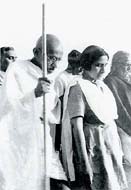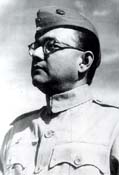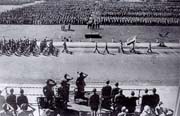'The people from the south are not
very good at blowing their trumpets'
It is true that the people in south India did not really object to
British rule?
 That's not true. And I can say that because they fought equally
hard against the British. They strongly resented the fact that
they were slaves. And the fact that they were sent off in shiploads
to other British colonies where they were forced to work as coolies.
This was, for them, a tremendous psychological and mental degradation.
That's not true. And I can say that because they fought equally
hard against the British. They strongly resented the fact that
they were slaves. And the fact that they were sent off in shiploads
to other British colonies where they were forced to work as coolies.
This was, for them, a tremendous psychological and mental degradation.
It is not right to say that the south approved of British rule,
or that they felt the benefits of British rule. And it is even
more wrong to say that they did not participate in the freedom
struggle. Why don't you get hold of the jail records and find
out how many people went to jail during that period?
There is a mistaken conception that the freedom movement was all
fought only in the north of India and that the south did not play
a very significant part. This is a very, very wrong impression
and it is mainly due to the fact that the people from the south
are not very good at blowing their own trumpets.
Journalists also forget about them. They take very few interviews.
And unless the person involved is a very controversial figure,
nothing comes of it. In the last few years, Jayalalitha has been
getting much more publicity and importance than all the people
who took part in the freedom struggle.
The south was a great follower of Mahatma Gandhi. Thousands of
them joined the satyagraha movement. You see, what made the south
different from the north was the fact that we had many social
revolutions there. This made it easier to implementing radical
ideas in the south; it also made it more difficult for communalism
and fundamentalism to gain root there.
We fought social revolutions there, which are as important as
political revolutions. We had this big movement against child
marriage and dowry. We had pro-widow-remarriage movement.
All these movements took place in the pre-independence period.
Women played a very important part in each of these movements.
And they played their part with courage.
The south was the first to implement reservation; they did it
in even before Independence. With the result with the result that
there isn't such a big caste divide in the south. Those who have
benefitted from the reservation had done very well, both for themselves
and for their whole community.
Besides, education has been a very prominent feature in the south.
They have realised that if one is educated, one can achieve anything.
And so, there has always been a great urge for education. Even
today, the literacy campaign is much stronger there. Most of the
business in India have all been started by people who originally
came from the south.
What about the soldiers in the INA?
 As far as the INA is concerned, I can probably say that amongst
the civilian population that were recruited, 85 per cent were
south Indians. Circumstances, of course, entailed that the Indians
who were living in Malaysia and Singapore, Burma, even Thailand
joined in very large numbers. These people were ordinary workers
in the rubber plantations and the public works department. We
did have a few professionals like lawyers, doctors and teachers
but it was the workers who formed the bulk of the civilian force.
Eighty-five per cent of the Rani of Jhansi regiment was made up
civilians who came from south India.
As far as the INA is concerned, I can probably say that amongst
the civilian population that were recruited, 85 per cent were
south Indians. Circumstances, of course, entailed that the Indians
who were living in Malaysia and Singapore, Burma, even Thailand
joined in very large numbers. These people were ordinary workers
in the rubber plantations and the public works department. We
did have a few professionals like lawyers, doctors and teachers
but it was the workers who formed the bulk of the civilian force.
Eighty-five per cent of the Rani of Jhansi regiment was made up
civilians who came from south India.
But there, the tragedy is that more of half these people worked
in those regions which are now in Asia. Even though they wanted
to return to India, the government of independent India never
welcomed them nor were they prepared to give them Indian citizenship.
They did not help these freedom fighters in any way.
Why do you think that happened?
 For a variety of reasons. The main reason was that they did not
realise the importance of helping these people. Or, may be, they
wanted to suppress the importance of the Rani of Jhansi regiment.
Keeping the economic condition of India in mind, some of these
people thought they were better off there.
For a variety of reasons. The main reason was that they did not
realise the importance of helping these people. Or, may be, they
wanted to suppress the importance of the Rani of Jhansi regiment.
Keeping the economic condition of India in mind, some of these
people thought they were better off there.
Those of them who were educated and faced conducive conditions
are doing very well for themselves. But there are many others,
the poorer people, who have died of disease and starvation. These
people do not get any facilities because they had been in the
INA - in fact, that is a disadvantage for them in getting jobs.
And yet, recently, when we undertook an expedition to recreate
the route of the INA, we saw what it meant to them. When the name
of the INA and Netaji was mentioned before them, their whole attitude
towards life changes. Their sunken eyes begin to sparkle. They
pull themselves up straight and they say 'Jai Hind' as smartly
and as forcefully as they can.
|

